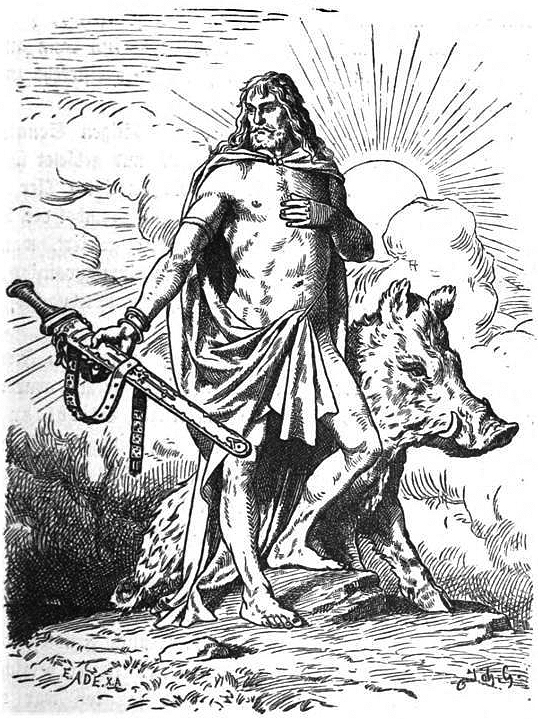Slashing Another Stoic Chain – Courtesy of a Norse God
This is something that has been staring me in the face without my seeing it – if it had been a snake it would have bitten me. Probably everyone else has realized this, and I am the last to see it, but this is to correct an oversight.
In the following passage from the letter to Menoeceus, Epicurus writes: “It is not an unbroken succession of drinking-bouts and of revelry, not sexual lust, not the enjoyment of the fish and other delicacies of a luxurious table, which produce a pleasant life….” In this passage, exactly what is Epicurus criticizing? Is he criticizing wine and revelry? No. Is he criticizing sexual lust? Certainly not. Is he criticizing the enjoyment of fine food? Absolutely not! So what IS he criticizing? Nothing more, and nothing less, than the **unbroken succession** of these activities! And how could he possibly mean anything else, when this list is very similar, if not identical, to those activities which he states elsewhere are the only ways he knows in what the good consists! “For I at least do not even know what I should conceive the good to be, if I eliminate the pleasures of taste, and eliminate the pleasures of sex, and eliminate the pleasures of listening, and eliminate the pleasant motions caused in our vision by a visible form.”
This observation is not only obvious, but it explains the rest of the passage: “…it is sober reasoning, searching out the grounds of every choice and avoidance, and banishing those beliefs through which the greatest tumults take possession of the soul.” All pleasures are good, and all pleasures – including revelry, sex, and fine food, are good and to be enjoyed. But the key is that these – as with all pleasures – must be enjoyed only in appropriate circumstances, times, and places, which we have determined after sober reasoning and after eliminating all those mental fears, such as of death and of the gods, that stand in our way from enjoying pure pleasure.
And as much as this may be offensive to the heirs of Aristotle and Stoicism, that is what *wisdom* is all about: “Of all this the beginning and the greatest good is wisdom. Therefore wisdom is a more precious thing even than philosophy ; from it spring all the other virtues, for it teaches that we cannot live pleasantly without living wisely, honorably, and justly; nor live wisely, honorably, and justly without living pleasantly. For the virtues have grown into one with a pleasant life, and a pleasant life is inseparable from them.” We pursue wisdom and the other virtues, and we apply wisdom and the other virtues, purely so we can engage in pleasure – including revelry, sexual relations, and fine food – without the penalty of those who mindlessly engage in these activities “in unbroken succession.”
Combine this with a study of the analogy of a vessel to be filled with pleasures (Lucretius Book VI), which illuminates the immediately preceding passage, and you come very close to being ready to completely sever the chains of Stoicism, which cause so many of us to distrust pleasure, and to entertain the idea that Epicurus was an ascetic. “When we say, then, that pleasure is the end and aim, we do not mean the pleasures of the prodigal or the pleasures of sensuality, as we are understood to do by some through ignorance, prejudice, or willful misrepresentation. By pleasure we mean the absence of pain in the body and of trouble in the soul.”
Epicurus builds his philosophy step by step, and we are expected to keep in mind what has gone before, and gone after, in understanding the whole. Epicurus did not drop a bomb to upset the applecart and turn the rest of his philosophy on its head by including this passage. He surely meant us to understand that everything else he said was also true, and that the limit of pleasure means nothing more than the limit of our experience. That limit is reached when we eradicate all but the most necessary pain of mind and body, AND we fill our vessel of life with the ordinary pleasures which Nature enables us to perceive. So long as we pursue them intelligently, and not in unbroken succession.
No, Plato, a course in geometry is NOT necessary to experience the best life. Nor, Aristotle, is a course in syllogistic reasoning. “Those who place the Chief Good in virtue alone are beguiled by the glamour of a name, and do not understand the true demands of nature. If they will consent to listen to Epicurus, they will be delivered from the grossest error.”
_________
Today’s post is brought to you in part by Freyr, the Nordic god of pleasure AND peace, and especially his sidekick golden boar, Gullenbursti, to whose contemplation today I owe to Jason Baker! Jason has also provided these links for further research on possible Freyr – Epicurean connections:




